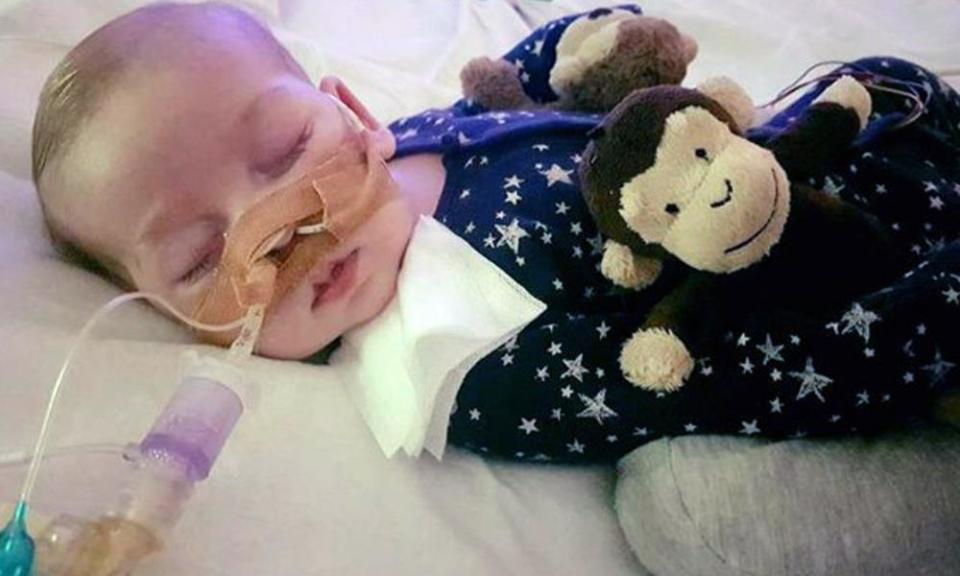Charlie Gard’s parents show the strength of human love | Giles Fraser

Some time in the next few days it looks likely that Charlie Gard will lose his struggle for life. All the evidence and all the experts have insisted that he has no hope of surviving his condition and that prolonging his life only brings him further suffering. But for all this, it will be the state that orders Charlie’s life support to be withdrawn, against the wishes of his battling, devoted parents. For them the state has become the enemy, first denying them the opportunity to take Charlie overseas for experimental treatment, then denying them the opportunity to take their baby home to die. Being a socialist, I am instinctively a big-state kind of person. I generally celebrate the power of the collective to curb the selfish instincts of the individual. But if the state came between me and the love I have for my child, I would rapidly become as state-friendly as the Unabomber.
I am still pondering a book that came out last year called Against Empathy. Written by the Yale psychology professor Paul Bloom, it argued that the emotional charge of empathy, of getting overembroiled in the pain and suffering of others, has morally problematic consequences. Blinded by the passion that empathy generates, we are prejudiced in favour of the people who are closest to us – whereas rationally we ought to count each person as a single moral unit, everyone being of equal value. Empathy, Bloom claims, is morally innumerate.
The book received many favourable reviews. The idea that you often have to distance yourself from feeling in order to be fair was widely deemed pretty persuasive. To be moral, and to be effective morally, you have to discount the swirling chaos of feeling – and become dispassionate, like a surgeon or a judge. Rational compassion requires the cold accountancy of units of pleasure over pain.
But we must tread carefully here. Because the danger of rational compassion is that it sets itself in opposition to something we used to be comfortable calling love. For centuries, love was the basis of our moral imagination. Love is also grounded in the biology of parent and child. But, for the rational utilitarian, love cannot survive as a serious moral force because love is highly prejudicial – by definition, preferring the welfare of its own to that of distant strangers. To love is to love some people more than others. Rational compassion, treating everyone exactly the same and suspecting passion of clouding judgment, is to discount love and so – to my mind – becomes something fundamentally inhuman.
This was precisely the conclusion that George Orwell came to about Gandhi. Gandhi wanted to love the whole world equally. And because of this he was suspicious of emphasis being placed on special relationships, romantic, filial or otherwise. For Orwell, however, this constituted a failure of Gandhi’s humanity – that Gandhi preferred some abstract principle of universal benevolence to the specific welfare of his wife and child.
The Charlie Gard case feels hugely significant because it has set the cool rational compassion of judicial judgment and clinical expertise against the passion of parental love. In times past, I feel sure that parental love would have won out. But now we live in an age where the idea of the rational has more kudos than that of love. These days – perhaps since the revolution in information technology – we feel more comfortable with the calculable, with the empirical, with the binary truths of evidence and science. We live in a world of ones and zeros. Being cynical, maybe being able to count things makes it easier to put a pound sign in front of them. And so now even compassion has to conform to this empirical rationality. Which is why those who have never smelled the specific perfume of Charlie’s neck, those who have never held him tight or wept and prayed over his welfare, are deemed better placed to determine how he is to live and die.
And in such circumstances, it is not only the state that has become the enemy; so has the very idea of rational judgment itself. And if that feels quite a lot to take on, so be it. I would rain fire on the whole world to hold my child for a day longer. Charlie’s parents are simply behaving like human beings in an increasingly inhuman world.

 Yahoo News
Yahoo News 